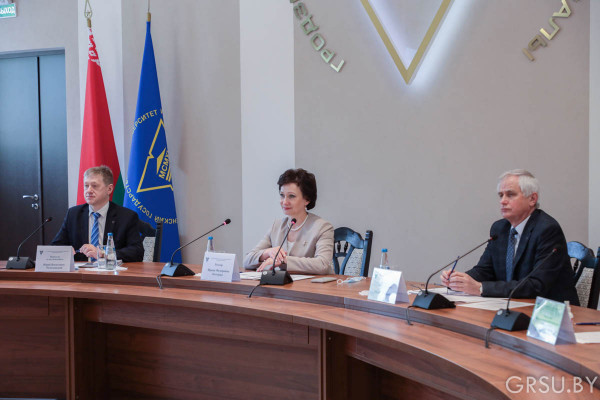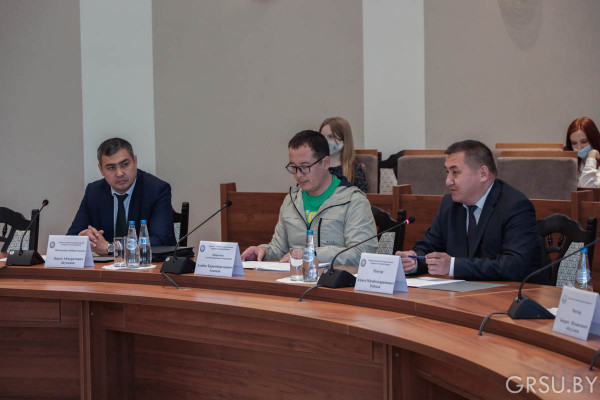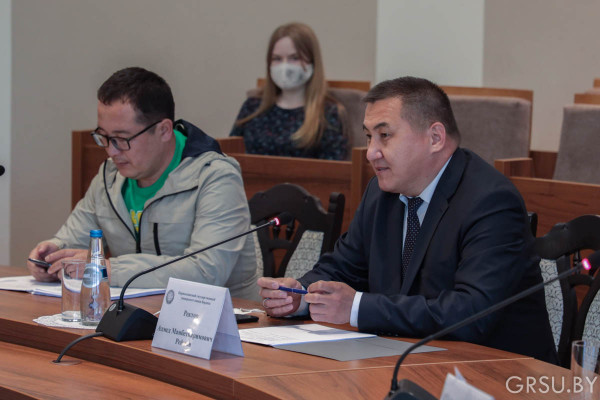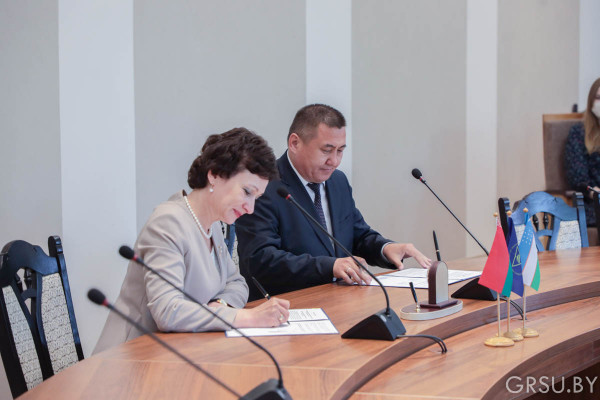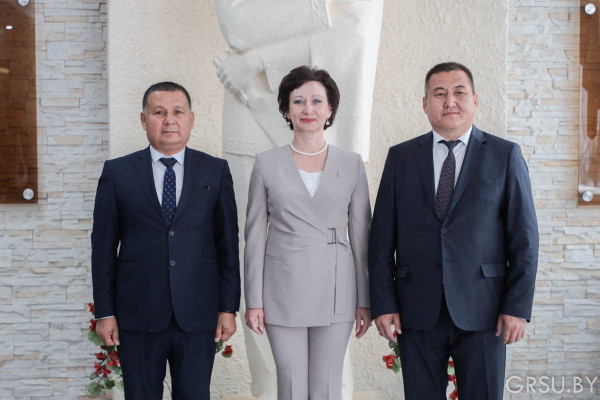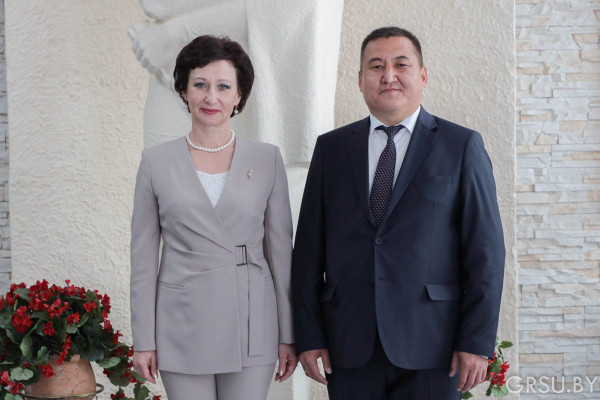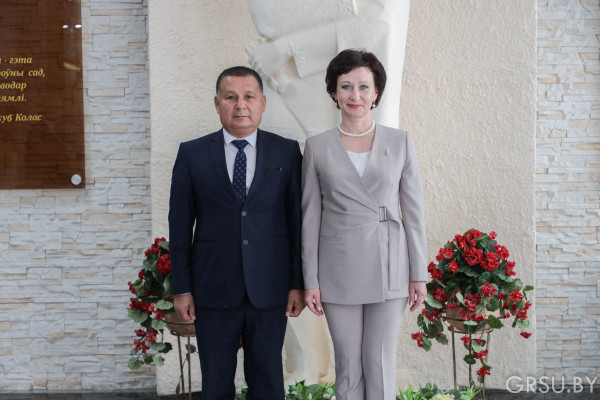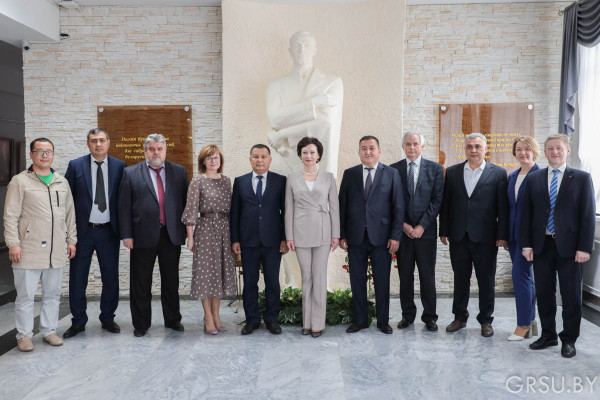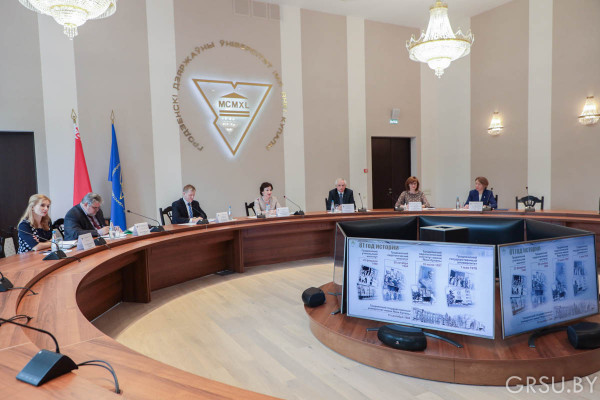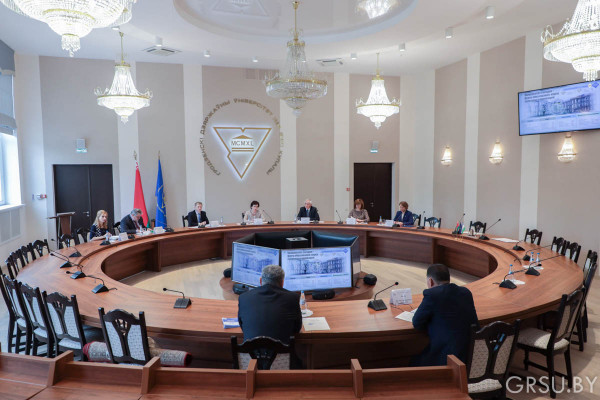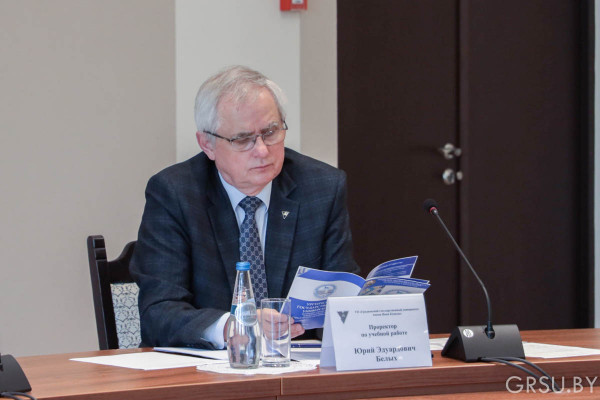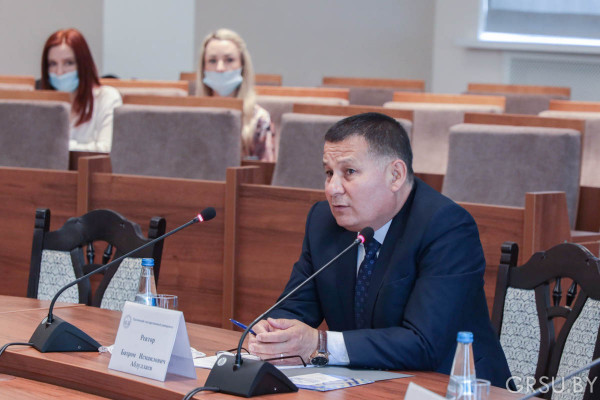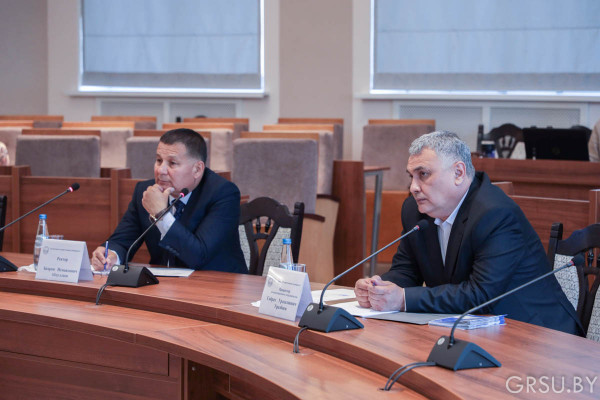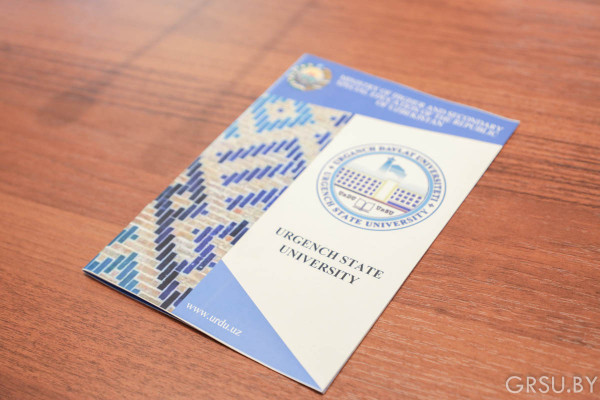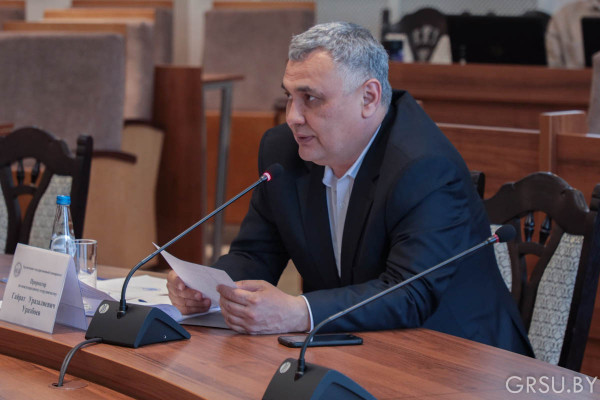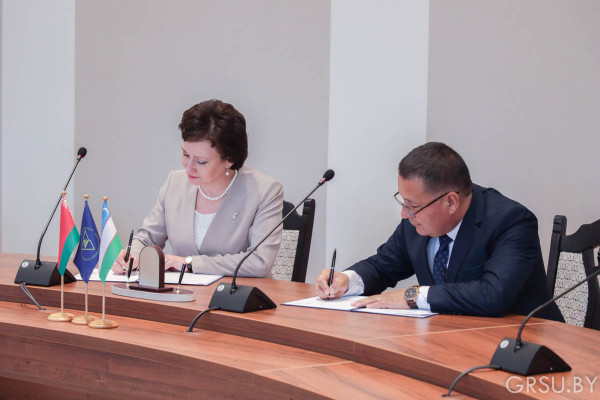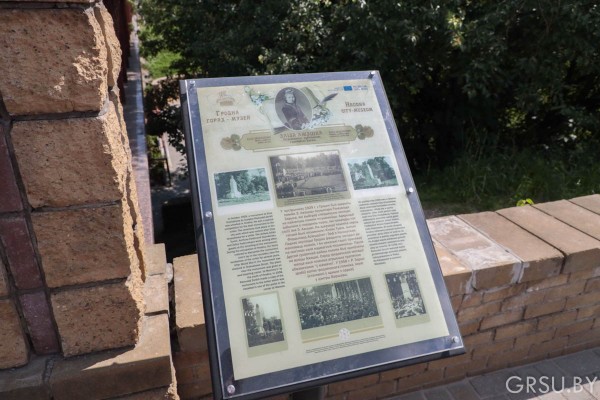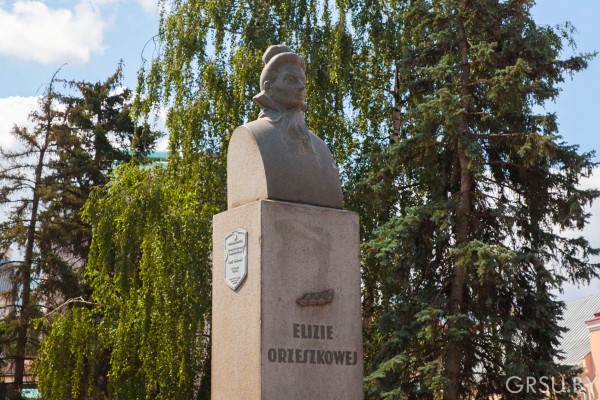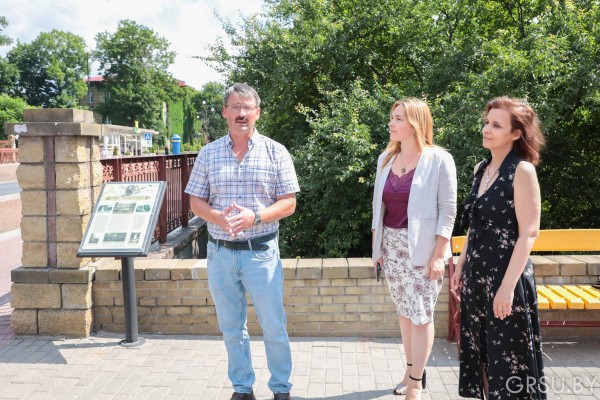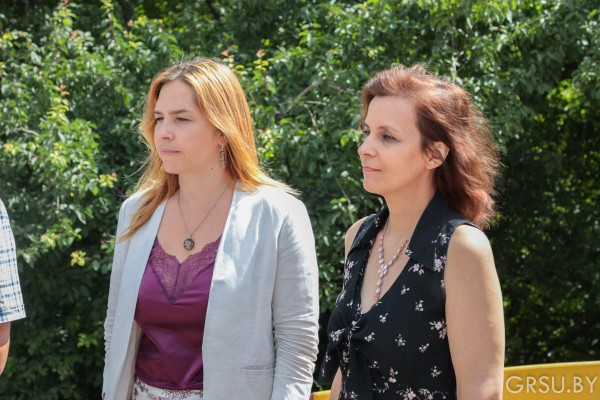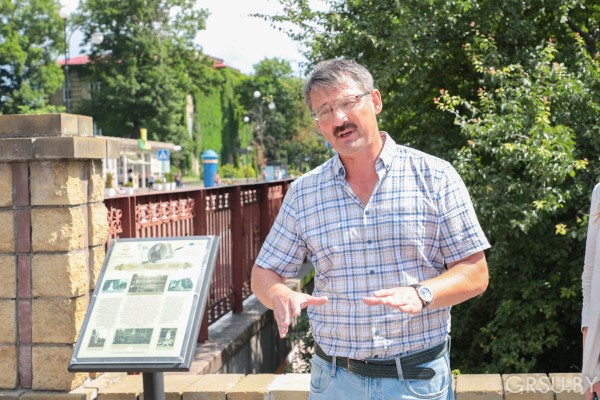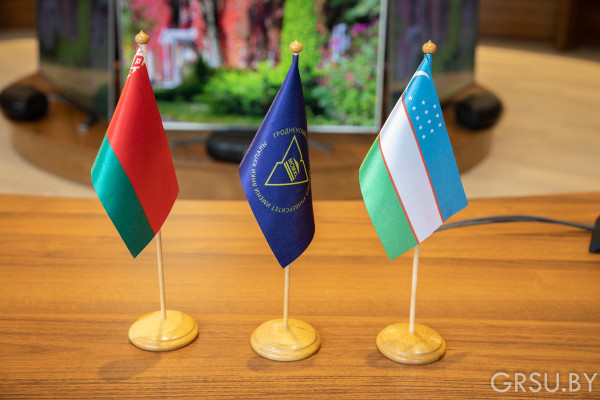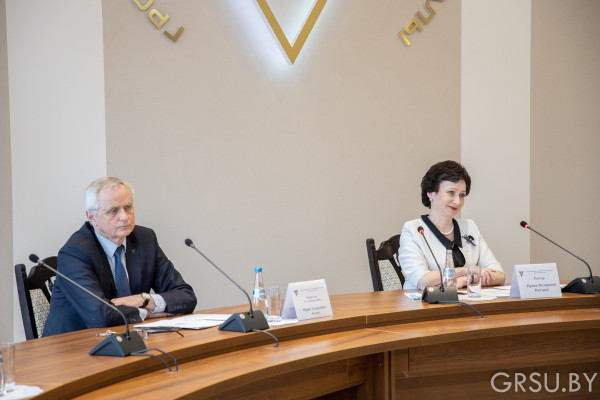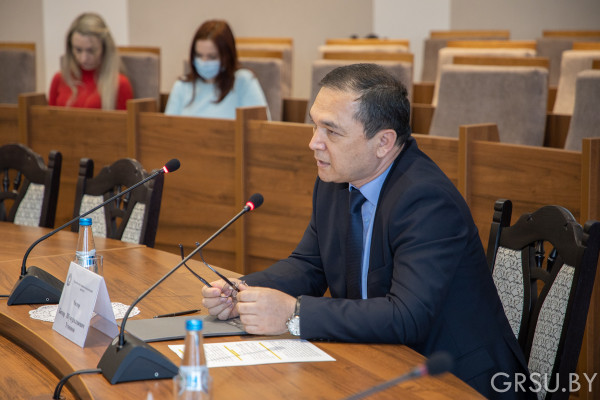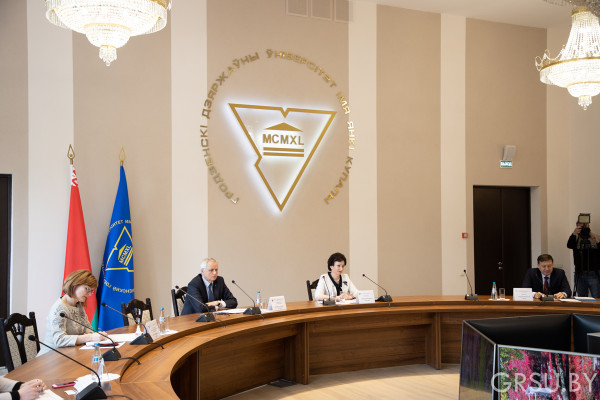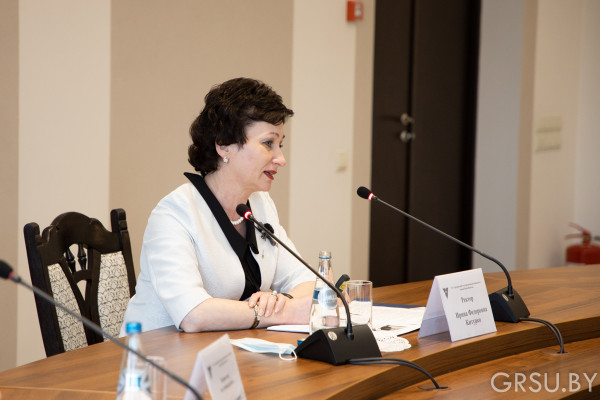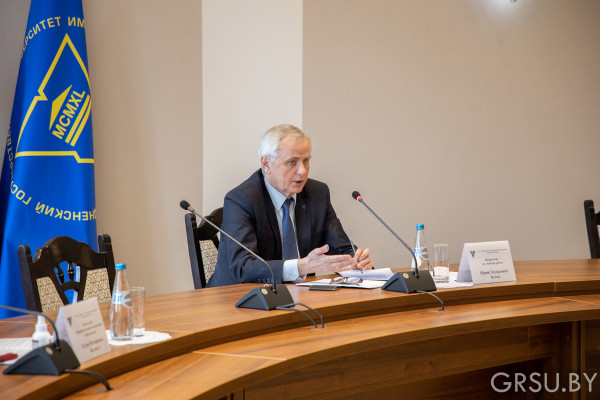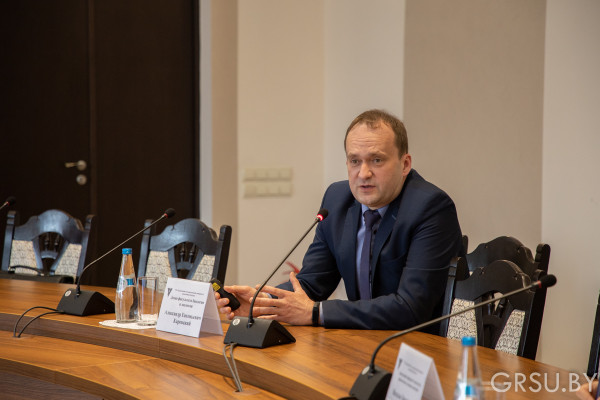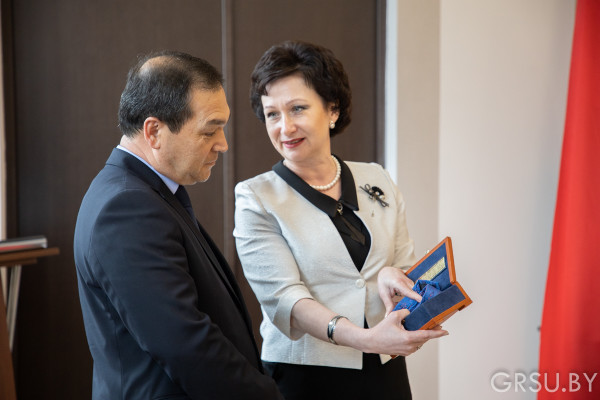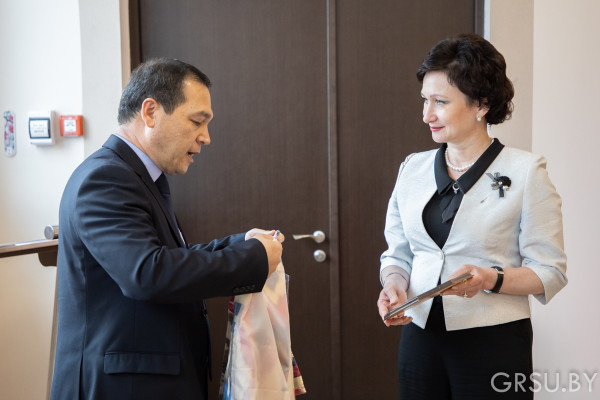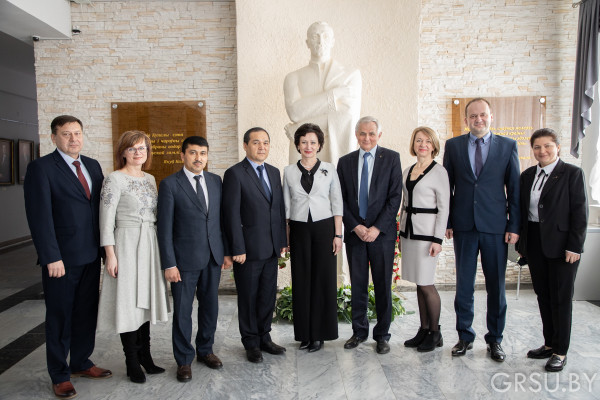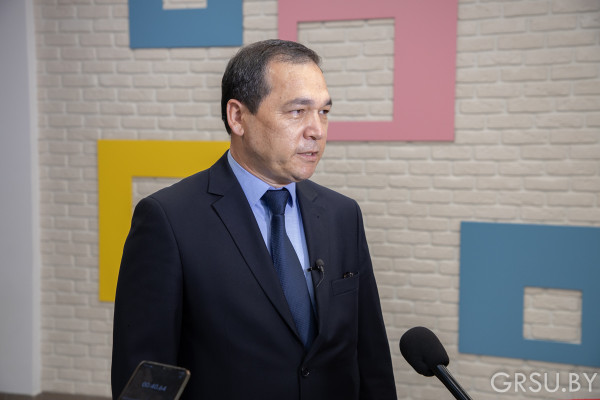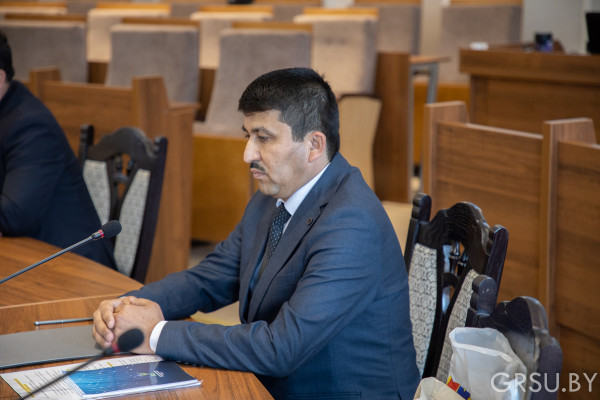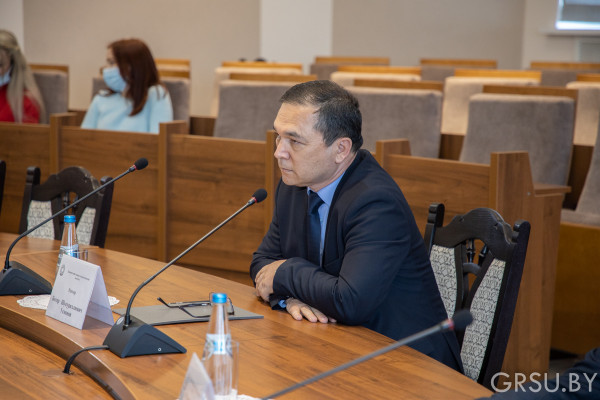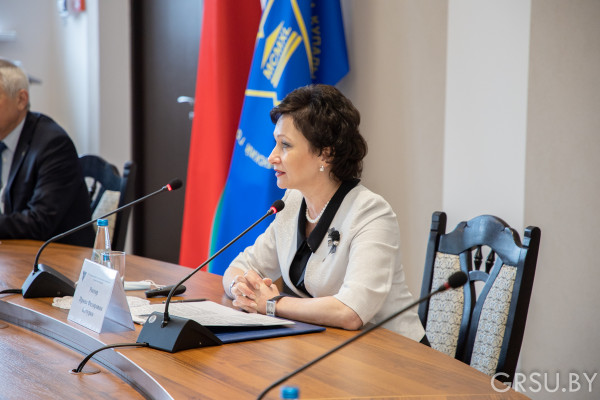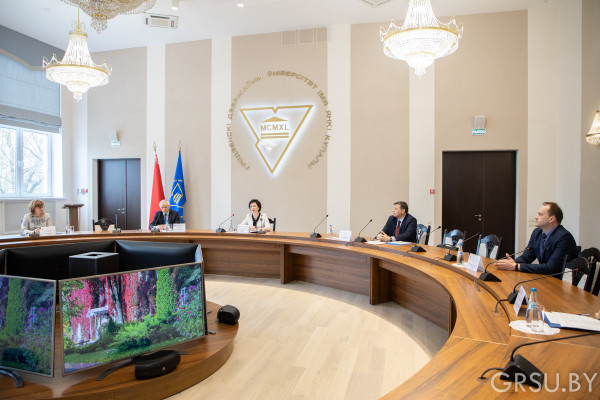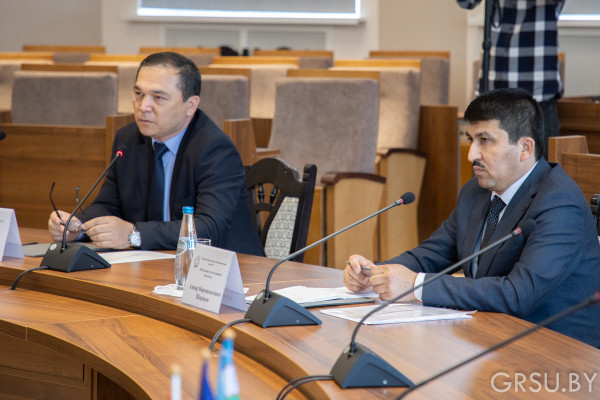
Yanka Kupala
State University of Grodno
Super User
In Yanka Kupala State University of Grodno were signed agreements on international cooperation with two universities of the Republic of Uzbekistan
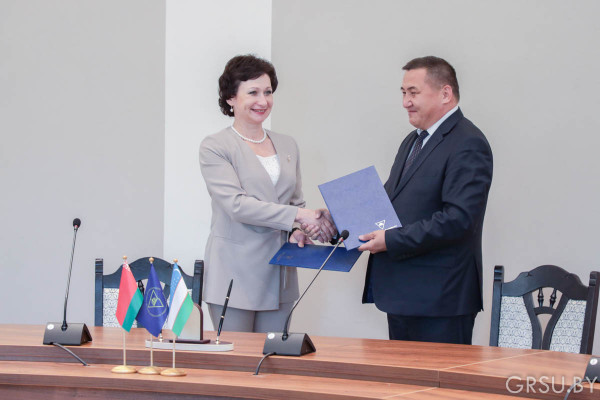
Rector of Urgench State University Bakhrom Abdullaev and Rector of Karakalpak State University Akhmet Reymov paid an official visit to Yanka Kupala State University of Grodno.
A delegation from the Republic of Uzbekistan, consisting of representatives of two institutions of higher education, arrived in Grodno at the invitation of the Yanka Kupala State University. As the Vice-Rector for Academic Affairs Yury Bialykh noted, it was YKSUG that initiated the establishment of mutually beneficial contacts with Urgench and Karakalpak State Universities. Potential partners were offered a study visit to Yanka Kupala State University of Grodno in order to substantively discuss promising areas for further interaction in the field of education, science and upbringing of students.
The visit of the delegation from Uzbekistan began with an official event with the participation of the rector of the Yanka Kupala State University Irina Kiturko. During the round table meeting, heads of universities presented their educational institutions and told in what directions they see further cooperation.
«At the moment, the Yanka Kupala State University of Grodno has concluded more than 200 agreements on international cooperation. Yanka Kupala State University interacts with the universities of the Republic of Uzbekistan within the framework of 8 agreements. oint educational program for the training of specialists with a higher education of the I stage with the Tashkent State University of Law in the specialty "International Law" according to the "3 + 1" scheme, a joint educational program for the "2 + 2" scheme for the training of specialists with higher education of the I stage Karshi State University with a degree in Applied Mathematics - are being successfully implemented. » said Irina Kiturko.
Work in this direction continues, said the rector of YKSUG. Recently, an agreement was signed on joint educational programs for training specialists with higher education of the I stage with Kokand State Pedagogical Institute named after Mukimi in four specialties: "Applied Mathematics", "Bioecology", "Psychology" and "Fine Arts and Computer Graphics". At the moment, a joint educational program is being designed with Karshi State University for the training of specialists with higher education of the II stage in the specialty "Computer engineering (programmable complexes, systems and services)".
During an official event at Yanka Kupala State University, Vice-Rector for Academic Affairs of Yanka Kupala State University Yury Bialykh drew the attention of participants of the dialogue to the development of potential related to tourism.
«I want to note that the first student from Uzbekistan who entered our university chose the specialty "Tourism and Hospitality", and here we see great potential. Our regions are attractive for tourists. On the territory of the Grodno region, 80 percent of the entire historical and cultural heritage of the Republic of Belarus is concentrated. » said Yury Bialykh
Vice-Rector for Science at YKSUG Yury Ramanouski, in turn, noted that a strong mathematical school has been created at our university. And here Yanka Kupala State University could also find points of contact with Urgench State University, the rector of which named good preparation of students in mathematical specialties among the advantages of his educational institution. In addition, the participants of the meeting expressed their interest in the implementation of joint projects in research activities.
` Summarizing what was said, the participants of the event agreed that there are many prospects for cooperation between universities, but it is necessary to highlight the main aspects on which the partners will have to focus in the near future. The meeting ended with the signing of agreements on international cooperation between Yanka Kupala State University of Grodno and Urgench State University, as well as Karakalpak State University.
Discussion of promising areas of mutually beneficial cooperation continued on the basis of Science and Technology Park of Yanka Kupala State University. A tour of the Technopark was organized for representatives of the delegation from the Republic of Uzbekistan, during which residents talked about their activities and innovative projects. There was also a presentation of Studio of Projects and Startups of YKSUG. Then the delegation from the Republic of Uzbekistan took part in the seminar "On the scientific and educational activities of the departments."
Reference information:
Urgench State University has 11 faculties, 36 departments, in which bachelors and masters are trained in 58 educational areas and 27 specialties. More than 16 thousand students study at the university, the teaching staff is 677 people. Urgench State University is actively involved in Erasmus + projects, collaborating with such universities as University of Aquila (Italy), University of Porto (Portugal), University of Keele (England), University of Padua (Italy), University of Cantabria (Spain) and Weihenstephan-Triesdorf University of Applied Sciences (Germany).
Karakalpak State University is one of the leading institutions of higher education in Uzbekistan. Training of young personnel is carried out in 49 bachelor's areas and 24 master's specialties. The university has 48 Doctors of sciences and professors, more than 200 PhD and associate professors. Karakalpak State University develops partnerships with more than 100 largest universities, takes part in educational programs TEMPUS, ERASMUS MUNDUS, ERASMUS + within the European Commission.
In Yanka Kupala State University of Grodno were signed agreements on international cooperation with two universities of the Republic of Uzbekistan

Rector of Urgench State University Bakhrom Abdullaev and Rector of Karakalpak State University Akhmet Reymov paid an official visit to Yanka Kupala State University of Grodno.
A delegation from the Republic of Uzbekistan, consisting of representatives of two institutions of higher education, arrived in Grodno at the invitation of the Yanka Kupala State University. As the Vice-Rector for Academic Affairs Yury Bialykh noted, it was YKSUG that initiated the establishment of mutually beneficial contacts with Urgench and Karakalpak State Universities. Potential partners were offered a study visit to Yanka Kupala State University of Grodno in order to substantively discuss promising areas for further interaction in the field of education, science and upbringing of students.
The visit of the delegation from Uzbekistan began with an official event with the participation of the rector of the Yanka Kupala State University Irina Kiturko. During the round table meeting, heads of universities presented their educational institutions and told in what directions they see further cooperation.
«At the moment, the Yanka Kupala State University of Grodno has concluded more than 200 agreements on international cooperation. Yanka Kupala State University interacts with the universities of the Republic of Uzbekistan within the framework of 8 agreements. oint educational program for the training of specialists with a higher education of the I stage with the Tashkent State University of Law in the specialty "International Law" according to the "3 + 1" scheme, a joint educational program for the "2 + 2" scheme for the training of specialists with higher education of the I stage Karshi State University with a degree in Applied Mathematics - are being successfully implemented. » said Irina Kiturko.
Work in this direction continues, said the rector of YKSUG. Recently, an agreement was signed on joint educational programs for training specialists with higher education of the I stage with Kokand State Pedagogical Institute named after Mukimi in four specialties: "Applied Mathematics", "Bioecology", "Psychology" and "Fine Arts and Computer Graphics". At the moment, a joint educational program is being designed with Karshi State University for the training of specialists with higher education of the II stage in the specialty "Computer engineering (programmable complexes, systems and services)".
During an official event at Yanka Kupala State University, Vice-Rector for Academic Affairs of Yanka Kupala State University Yury Bialykh drew the attention of participants of the dialogue to the development of potential related to tourism.
«I want to note that the first student from Uzbekistan who entered our university chose the specialty "Tourism and Hospitality", and here we see great potential. Our regions are attractive for tourists. On the territory of the Grodno region, 80 percent of the entire historical and cultural heritage of the Republic of Belarus is concentrated. » said Yury Bialykh
Vice-Rector for Science at YKSUG Yury Ramanouski, in turn, noted that a strong mathematical school has been created at our university. And here Yanka Kupala State University could also find points of contact with Urgench State University, the rector of which named good preparation of students in mathematical specialties among the advantages of his educational institution. In addition, the participants of the meeting expressed their interest in the implementation of joint projects in research activities.
` Summarizing what was said, the participants of the event agreed that there are many prospects for cooperation between universities, but it is necessary to highlight the main aspects on which the partners will have to focus in the near future. The meeting ended with the signing of agreements on international cooperation between Yanka Kupala State University of Grodno and Urgench State University, as well as Karakalpak State University.
Discussion of promising areas of mutually beneficial cooperation continued on the basis of Science and Technology Park of Yanka Kupala State University. A tour of the Technopark was organized for representatives of the delegation from the Republic of Uzbekistan, during which residents talked about their activities and innovative projects. There was also a presentation of Studio of Projects and Startups of YKSUG. Then the delegation from the Republic of Uzbekistan took part in the seminar "On the scientific and educational activities of the departments."
Reference information:
Urgench State University has 11 faculties, 36 departments, in which bachelors and masters are trained in 58 educational areas and 27 specialties. More than 16 thousand students study at the university, the teaching staff is 677 people. Urgench State University is actively involved in Erasmus + projects, collaborating with such universities as University of Aquila (Italy), University of Porto (Portugal), University of Keele (England), University of Padua (Italy), University of Cantabria (Spain) and Weihenstephan-Triesdorf University of Applied Sciences (Germany).
Karakalpak State University is one of the leading institutions of higher education in Uzbekistan. Training of young personnel is carried out in 49 bachelor's areas and 24 master's specialties. The university has 48 Doctors of sciences and professors, more than 200 PhD and associate professors. Karakalpak State University develops partnerships with more than 100 largest universities, takes part in educational programs TEMPUS, ERASMUS MUNDUS, ERASMUS + within the European Commission.
Rector of Tashkent Chemical-Technological Institute Botir Usmonov visited Yanka Kupala State University of Grodno (VIDEO ADDED)
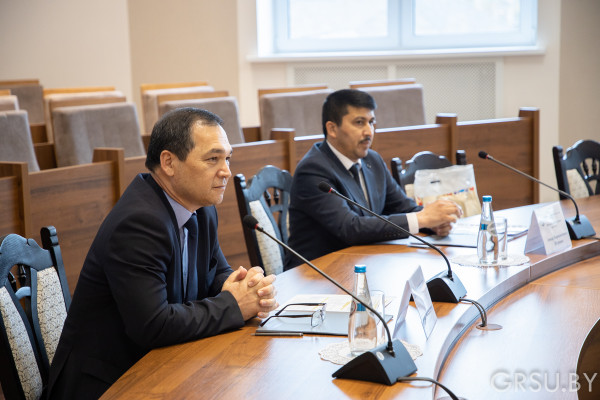
During the visit on April 28, the prospects for cooperation on the implementation of joint educational programs were discussed.
The visit of Tashkent Chemical-Technological Institute management to the YKSUG took place less than two months after the conclusion of an agreement on cooperation between the universities. The document was signed on March 4, 2021 during the visit of the Belarusian delegation to the Republic of Uzbekistan, in which YKSUG was represented by Vice-Rector for Academic Affairs Yury Bialykh. Preliminary agreements were reached on joint scientific research on areas of mutual interest, the projecting and implementation of joint educational programs, on the organization and conduct of internships for teachers and students of Tashkent Chemical-Technology Institute at Yanka Kupala State University of Grodno.
The discussion of the agreements that have already been achieved continued during the visit to the University of Partners from Uzbekistan. As part of a small delegation were the Rector of Tashkent Chemical-Technology Institute, the Usmonov Botir, as well as the Head of Department of the Double Degree, Anvar Shernaev. Usmonov Botir drew attention to the fact that in Uzbekistan, in recent years, great attention is paid to the field of education. At the same time, he emphasized his interest in more detailed familiarization with the achievements of Yanka Kupala State University of Grodno in the field of education, science, as well as commercialization of scientific activities.
«We are interested in your work experience. Therefore, we strive to build good relationships, establish mutually beneficial cooperation with universities of the Republic of Belarus, because the scientific potential of your country is very high. However, we have similar sectors of the economy. And our countries cooperate at the highest level in various directions - chemical industry, mechanical engineering, food and humanitarian sphere, culture. I am confident that academic mobility, exchange of teachers, methodology support will be useful to both states. » noted Botir Usmonov.
The Rector of YKSUG, Irina Kiturko, agreed that cooperation with Uzbekistan becomes a strategic and priority direction for the establishments of Belarus.
«We already have experience working with universities in Uzbekistan. The first cooperation agreement was concluded with Tashkent State Transport University in 2009. To date, there are already 8 such agreements. I would like to note that 4 of them were signed last year. The vectors of cooperation are very wide. First of all, these are academic mobility programs for students and university staff. This is the Visiting Professor program, joint training of specialists, joint educational programs. » Irina Kurturko shared.
Irina Kiturko also noted that at the moment at the Yanka Kupala State University of Grodno, joint educational programs are being implemented to train specialists of Undergraduate education with Tashkent State University of Law, specializing in «International Law», as well as with Karshi State University, specializing in «Applied Mathematics». An agreement is being developed on joint educational programs for training specialists of Undergraduate education with Kokand State Pedagogical Institute named after Mukimi in four specialties: «Applied Mathematics», «Bioecology», «Psychology» and «Fine Arts and Computer Graphics».
In turn, representatives of Tashkent Chemical-Technological Institute expressed interest in the implementation of a joint educational program in the specialty «Foodstuff Production and Catering Management. » Moreover, they drew attention to the fact that they are ready to conduct a dialogue both on the joint training of specialists of Undergraduate education, and on the possibility of implementing joint educational programs at the level of secondary specialized education.
«Indeed, Technological College is a part of both Yanka Kupala State University of Grodno and Tashkent Chemical-Technological Institute. We are also interested in establishing mutually beneficial cooperation between our colleges. » rector of YKSUG Irina Kiturko continued the topic.
The director of Technological College of Yanka Kupala State University of Grodno Andrey But, Dean of the Faculty of Biology and Ecology Alexander Karevsky, Head of the Department of Technology, Physiology and Nutritional Hygiene Natalia Bashun also took part in the discussion of possible areas of cooperation. After the negotiations were over, the guests were given an excursion around the university, as well as around the city with a visit to OJSC «Molochny Mir». In the near future, the delegation of YKSUG plans to visit Tashkent Chemical-Technological Institute with a return visit.
Rector of Tashkent Chemical-Technological Institute Botir Usmonov visited Yanka Kupala State University of Grodno (VIDEO ADDED)

During the visit on April 28, the prospects for cooperation on the implementation of joint educational programs were discussed.
The visit of Tashkent Chemical-Technological Institute management to the YKSUG took place less than two months after the conclusion of an agreement on cooperation between the universities. The document was signed on March 4, 2021 during the visit of the Belarusian delegation to the Republic of Uzbekistan, in which YKSUG was represented by Vice-Rector for Academic Affairs Yury Bialykh. Preliminary agreements were reached on joint scientific research on areas of mutual interest, the projecting and implementation of joint educational programs, on the organization and conduct of internships for teachers and students of Tashkent Chemical-Technology Institute at Yanka Kupala State University of Grodno.
The discussion of the agreements that have already been achieved continued during the visit to the University of Partners from Uzbekistan. As part of a small delegation were the Rector of Tashkent Chemical-Technology Institute, the Usmonov Botir, as well as the Head of Department of the Double Degree, Anvar Shernaev. Usmonov Botir drew attention to the fact that in Uzbekistan, in recent years, great attention is paid to the field of education. At the same time, he emphasized his interest in more detailed familiarization with the achievements of Yanka Kupala State University of Grodno in the field of education, science, as well as commercialization of scientific activities.
«We are interested in your work experience. Therefore, we strive to build good relationships, establish mutually beneficial cooperation with universities of the Republic of Belarus, because the scientific potential of your country is very high. However, we have similar sectors of the economy. And our countries cooperate at the highest level in various directions - chemical industry, mechanical engineering, food and humanitarian sphere, culture. I am confident that academic mobility, exchange of teachers, methodology support will be useful to both states. » noted Botir Usmonov.
The Rector of YKSUG, Irina Kiturko, agreed that cooperation with Uzbekistan becomes a strategic and priority direction for the establishments of Belarus.
«We already have experience working with universities in Uzbekistan. The first cooperation agreement was concluded with Tashkent State Transport University in 2009. To date, there are already 8 such agreements. I would like to note that 4 of them were signed last year. The vectors of cooperation are very wide. First of all, these are academic mobility programs for students and university staff. This is the Visiting Professor program, joint training of specialists, joint educational programs. » Irina Kurturko shared.
Irina Kiturko also noted that at the moment at the Yanka Kupala State University of Grodno, joint educational programs are being implemented to train specialists of Undergraduate education with Tashkent State University of Law, specializing in «International Law», as well as with Karshi State University, specializing in «Applied Mathematics». An agreement is being developed on joint educational programs for training specialists of Undergraduate education with Kokand State Pedagogical Institute named after Mukimi in four specialties: «Applied Mathematics», «Bioecology», «Psychology» and «Fine Arts and Computer Graphics».
In turn, representatives of Tashkent Chemical-Technological Institute expressed interest in the implementation of a joint educational program in the specialty «Foodstuff Production and Catering Management. » Moreover, they drew attention to the fact that they are ready to conduct a dialogue both on the joint training of specialists of Undergraduate education, and on the possibility of implementing joint educational programs at the level of secondary specialized education.
«Indeed, Technological College is a part of both Yanka Kupala State University of Grodno and Tashkent Chemical-Technological Institute. We are also interested in establishing mutually beneficial cooperation between our colleges. » rector of YKSUG Irina Kiturko continued the topic.
The director of Technological College of Yanka Kupala State University of Grodno Andrey But, Dean of the Faculty of Biology and Ecology Alexander Karevsky, Head of the Department of Technology, Physiology and Nutritional Hygiene Natalia Bashun also took part in the discussion of possible areas of cooperation. After the negotiations were over, the guests were given an excursion around the university, as well as around the city with a visit to OJSC «Molochny Mir». In the near future, the delegation of YKSUG plans to visit Tashkent Chemical-Technological Institute with a return visit.
VI Berkovsky readings "Book culture in the context of international contacts" were held at Yanka Kupala State University
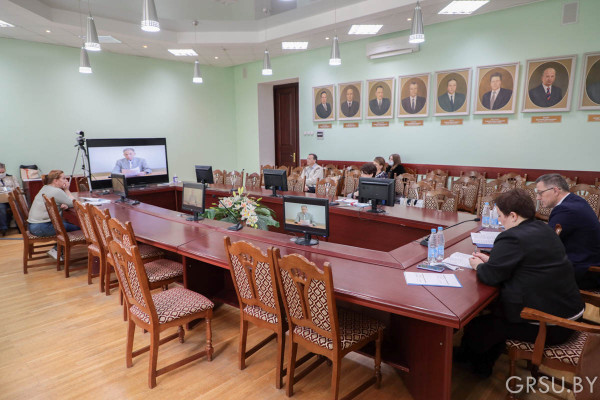
The international scientific forum, which was held jointly by the Academy of Sciences of Belarus and the Academy of Sciences of the Russian Federation, brought together over 150 participants - bibliologists, historians, philologists and sociologists.
On the first day, at the opening of the VI Berkovsky Readings, a greeting to the forum participants was read by Chairman of the Presidium of the National Academy of Sciences of Belarus, Head of the International Association of Academies of Sciences Vladimir Gusakov, as well as President of the Russian Academy of Sciences Alexander Sergeev. Then the rector of Yanka Kupala State University Irina Kiturko addressed the scientists who had gathered within the walls of Kupala University and also joined the online conference with a welcoming speech.
- It is a great pride to receive the participants of such a high scientific forum within the walls of our university, - said Irina Kiturko. - It is difficult to overestimate the importance of books and book culture in the fate of every nation. And, of course, the topic “Book culture in the context of international contacts” is especially relevant today. I wish all forum participants to enjoy communicating with other scientists, representatives of different countries, as well as fruitful work and success in your further research activities!
The VI Berkovsky Readings began with a plenary session, after which the participants began to work in sections. For two days, scientists discussed the symbiosis of book and electronic cultures, the socio-cultural aspect of reading in modern society and historical retrospective, as well as current trends in library, museum and archival activities.
Nikolai Grinko, director of the Yanka Kupala Yanka State University Scientific Library, said that the Berkovsky Readings are a brand conference for Belarus, which is held annually in different cities of our republic.
- The book gives knowledge, thanks to the book a person has the opportunity to develop, improve and become a real professional in his field, - said Nikolai Grinko. - The thematic field of the conference, as always, is quite wide. I would especially like to emphasize that within the framework of the VI Berkovsky Readings, which are held in the youth capital of Belarus - in Grodno, there is a section “Book culture in youth research”.
The international scientific conference, founded in honor of Pavel Naumovich Berkov, a Soviet literary critic, bibliographer, bibliologist and literary historian, is held under the auspices of the International Association of Academies of Sciences. Scientists and leading specialists from academies of sciences, institutions of higher education, museums, archives, libraries of Belarus, Russia, Lithuania, Ukraine, France, Czech Republic, China took part in the forum in Grodno.
Rector of Yanka Kupala State University Irina Kiturko took part in the International Conference dedicated to the 30th anniversary of the founding of the Tashkent Institute of Chemical Technology
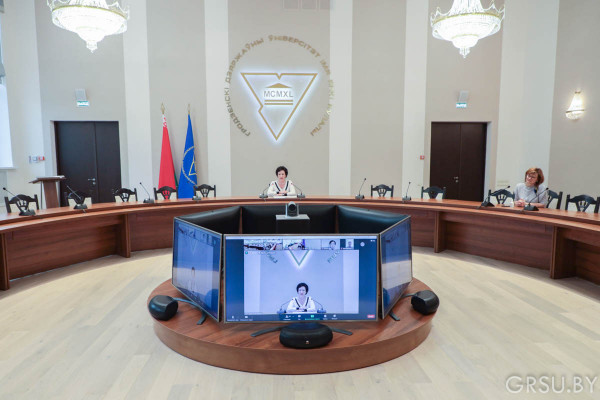
The scientific conference "Actual problems of innovative technologies in the development of the chemical, oil and gas and food industries" was held on May 25, 2021 online.
In addition to representatives of higher education institutions of the Republic of Uzbekistan, scientists from Spain, the Republic of Korea, India, a number of Russian universities - Kazan National Research Technological University, D. Mendeleev Russian Chemical-Technological University, Tambov State Technical University, Moscow State University of Food Production , as well as universities of Belarus: Belarusian State Technological University, Mogilev State University of Food and Chemical Technologies and Yanka Kupala State University of Grodno took part in the conference.
During the opening of the conference, the rector of Kupala University Irina Kiturko addressed the participants of the scientific forum with a welcoming speech. In her speach, Irina Fedorovna emphasized the presence of good prospects in the field of interuniversity cooperation with the Tashkent Chemical-Technological Institute and recalled that in April 2021 the delegation of the Tashkent Chemical-Technological Institute, headed by the rector, visited the Yanka Kupala State University of Grodno to get acquainted with the university and discuss the prospects for cooperation. She also expressed confidence that the bilateral interest and mutual respect achieved at the level of rectors will inspire staff and students to participate in joint projects in the field of education and science. Rector noted the relevance of the scientific conference held by the Tashkent Chemical-Technological Institute, congratulated the staff of the institute on its 30th anniversary and wished to be the drivers of the country's innovative development, to have breakthrough scientific discoveries and expressed confidence that cooperation between the universities of the Republic of Belarus and the Republic of Uzbekistan will be fruitful and successful.
Let us recall that the Yanka Kupala State University of Grodno took the initiative to establish cooperation in February 2021. In March 2021, as part of his participation in the 8th meeting of the Joint Intergovernmental Commission on Bilateral Cooperation between the Republic of Belarus and the Republic of Uzbekistan, Vice-Rector for Academic Affairs Yuri Belykh visited the Tashkent Institute of Chemical Technology, a meeting with the leadership and the signing of an Agreement on International Cooperation took place.
The parties agreed on cooperation in the following areas: design and implementation of joint educational programs for training specialists with higher education of the 1st stage in the specialty "Manufacturing of products and organization of public catering", II stage in the specialties "Biochemistry", "Innovative technologies in mechanical engineering (processing of mechanical engineering) "; design and implementation of educational programs at the level of secondary specialized education, including joint programs with the Technological College of the Yanka Kupala State University of Grodno in various specialties with the possibility of continuing education in higher education programs in a shorter time frame; exchange of students for training in the specialty for 1-2 semesters; joint scientific research, implementation of international projects, as well as other areas of mutual interest.
Love has no boundaries: the international reciting competition "Love will save the world" was held at Kupala University
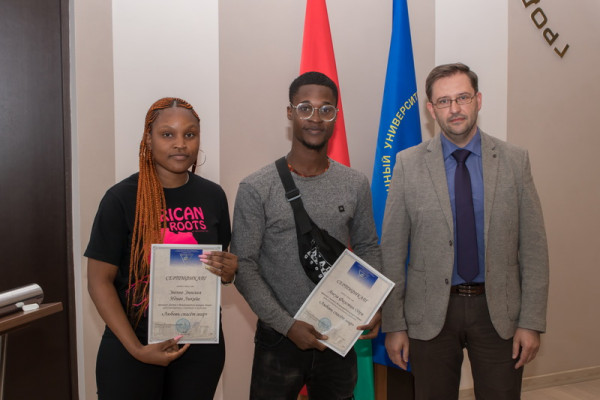
Every year the competition attracts more and more participants. This year, oratorical skills were demonstrated by 37 contestants from 15 countries of the world. Foreign students from the USA, Poland, Iraq, Sri Lanka, India, Maldives, Congo, Togo, Cameroon, Azerbaijan and many other countries presented their speech and oratory skills to the competent jury in reading the poems of Russian classics.
Vasily Senko, Vice-Rector for Educational Work at Yanka Kupala State University, addressed the participants of the International Competition with a welcoming speech. Inna Samoilova, head of the department of language training of Belarusian and foreign citizens, acted as the chairman of the jury of the competition. The competent jury also included foreign guests - an adjunct of the Department of Pragmatics of Communication and Linguodidactics of the Institute of Russian Studies and Oriental Studies of the University of Gdansk of the Republic of Poland Joanne Mampe and senior lecturer at Georgetown University in the USA Jill Ann Neuendorf.
The project brought together foreign students who study at Yanka Kupala State University of Grodno, Grodno State Medical University, Grodno State Agrarian University, Gdansk University of the Republic of Poland and Georgetown University of the United States. For the first time, students from the educational institution "BIP - University of Law and Social and Information Technologies" took part in it.
According to the level of language proficiency, the project participants were divided into two groups - the first included students who have been studying Russian for less than a year, the second - those who have been studying it for more than two years.
According to the organizers of the competition, even those students who started learning Russian only three weeks ago competed. The international jury, which included employees and teachers of Kupala University and a number of other Belarusian universities, representatives from Poland and the United States, assessed in the participants' speeches the correctness of the emotional and semantic interpretation of the works, the technique and accuracy of reproduction, the correctness of rhythm, intonation and pronunciation of sounds.
According to the results of the International Readers' Competition "Love will save the world" in a group of students studying Russian from several months to a year, the winner was a student of the Yanka Kupala State University Mbuyu Sebastian Kipalamoto with Yevgeny Yevtushenko's poem "There are no uninteresting people in the world ...". The second place was shared by the students Fabian Gzhivna from the University of Gdansk with Fyodor Tyutchev's poem "You are my sea wave" and Efoloko Eli Bolombo from Yanka Kupala State University, who read Robert Rozhdestvensky's poem "Everything starts with love." The third place was awarded to Evenie Emilia Ndive Likiye and Aneua Faustin Audri from the Grodno State Agrarian University, who performed the poem by Konstantin Simonov "Wait for me", as well as Mart Julia from the University of Gdansk with the poem by Anna Akhmatova and I know you are not alive Kanonge Priska Kabambi from Yanka Kupala State University of Grodno with Lyudmila Rubalskaya's poem "I love to dream under the sound of rain."
In the group of participants who have been studying the Russian language for more than two years, the winner was a student from Grodno State Medical University, Ashroff Rumi Mohamed Affri, who presented an excerpt from the poem "Students" by Eduard Asadov. The jury awarded the second place to the student of "BIP - University of Law and Social and Information Technologies" Margarita Lashtun and student of the Grodno State Medical University Aishat Atifa Ali with the poem "Pharmacy of Happiness" by Eduard Asadov. Third place was shared by Gdansk University students Victoria Stuchka with Mikhail Lermontov's poem “She was beautiful like a dream” and Veronika Plotka with Robert Rozhdestvensky's poem “Air ...”, as well as Mariyam Mikasha from Grodno State Medical University, who demonstrated Eduard Asadov's poem “Snow is falling ".
According to the results of the in-person audience voting, a diploma of audience sympathy was also awarded - a student of Yanka Kupala State University Efoloko Eli Bolombo became its owner. In addition, the participants of the competition were also awarded with diplomas in special 19 nominations.
The organizer of the International Readers' Competition "Love will save the world" was traditionally the Department of Language Training of Belarusian and Foreign Citizens of the Faculty of Pre-University Training together with the Center for Internationalization of Education, the Office of Educational Work with Youth, and the Center for Public Relations.
Yanka Kupala State University of Grodno signed agreements on international cooperation with two universities of the Republic of Uzbekistan
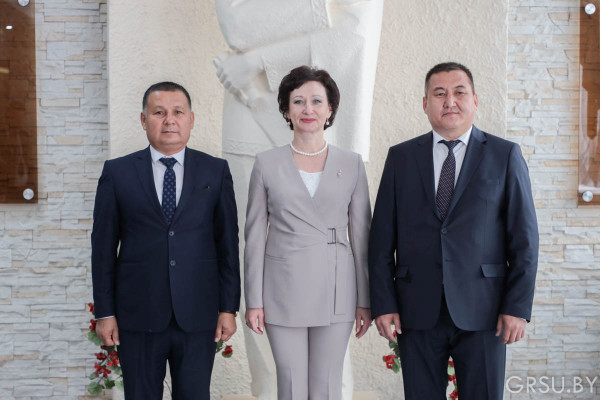
Rector of Urgench State University Bahrom Abdullayev and Rector of Karakalpak State University Akhmed Reimov paid an official visit to Kupala University.
A delegation from the Republic of Uzbekistan, consisting of representatives of two institutions of higher education, arrived in Grodno at the invitation of the Yanka Kupala State University. As the Vice-Rector for Academic Affairs Yuri Belykh noted, it was Kupala University that initiated the establishment of mutually beneficial contacts with Urgench and Karakalpak State Universities. Potential partners were offered a study visit to Yanka Kupala State University of Grodno in order to substantively discuss promising areas for further interaction in the field of education, science and upbringing of students.
The visit of the delegation from Uzbekistan began with an official event with the participation of the rector of the Yanka Kupala State University Irina Kiturko. During the round table meeting, heads of universities presented their educational institutions and voiced in which directions they see further cooperation.
- Today, the Yanka Kupala State University of Grodno has signed more than 200 agreements on international cooperation. Kupala University interacts with the universities of the Republic of Uzbekistan within the framework of 8 agreements, - said Irina Kiturko. - A joint educational program for the training of specialists with a higher education of the first stage with the Tashkent State University of Law in the specialty "International Law" according to the "3 + 1" scheme, a joint educational program according to the "2 + 2" scheme for the training of specialists with a higher education of the I degrees with Karshi State University with a degree in Applied Mathematics. In general, more than 10 agreements have been concluded on the implementation of joint educational programs with universities in China, Kazakhstan and other countries.
Work in this direction continues, as noted by the rector of Yanka Kupala State University. Recently, an agreement was signed on joint educational programs for training specialists with higher education of the first stage with the Kokand State Pedagogical Institute named after Mukimiy in four specialties: "Applied Mathematics", "Bioecology", "Psychology" and "Fine Arts and Computer Graphics". At the moment, a joint educational program is being designed with Karshi State University for the training of specialists with higher education of the II stage in the specialty "Computer engineering (programmable complexes, systems and services)".
During an official event at Kupala University, Vice-Rector for Academic Affairs of Yanka Kupala State University Yuri Belykh drew the attention of the dialogue participants to the development of potential related to tourism.
- I would like to note that the first student from Uzbekistan who entered our university chose the specialty “Tourism and hospitality”, - Yuri Belykh emphasized. - And here we see great potential. Our regions are attractive for tourists. 80% of the entire historical and cultural heritage of the Republic of Belarus is concentrated on the territory of the Grodno region.
Vice-rector for scientific work of Yanka Kupala State University Yuri Romanovsky, in turn, noted that a strong mathematical school has been created at our university. And here Kupala University could also find points of contact with Urgench State University, the rector of which, among the advantages of his educational institution, named precisely the good preparation of students in mathematical specialties. In addition, the meeting participants expressed interest in the implementation of joint projects in research activities.
Summarizing what was said, the participants of the event agreed that there are many prospects for cooperation between universities, but it is necessary to highlight the main aspects on which the partners will have to focus in the near future. The meeting ended with the signing of agreements on international cooperation between the Yanka Kupala State University of Grodno and the Urgench State University, as well as the Karakalpak State University.
Discussion of promising areas of mutually beneficial cooperation continued on the basis of Science and Technology Park of the Yanka Kupala State University. A tour of the Technopark was organized for representatives of the delegation from the Republic of Uzbekistan, during which residents talked about their activities and innovative projects. There was also a presentation of the Studio of Projects and Startups of Kupala University. Then the delegation from the Republic of Uzbekistan took part in the seminar "On the scientific and educational activities of the departments."
For reference:
Urgench State University has 11 faculties, 36 departments, in which bachelors and masters are trained in 58 educational areas and 27 specialties. More than 16 thousand students study at the university, the teaching staff is 677 people. Urgench State University is actively involved in Erasmus + projects, collaborating with such universities as the University of Aquila (Italy), the University of Porto (Portugal), the University of Keele (England), the University of Padua (Italy), the University of Cantabria (Spain) and the Weinstephan-Trisdorf University of Applied Sciences (Germany).
Karakalpak State University is one of the leading institutions of higher education in Uzbekistan. Training of young personnel is carried out in 49 bachelor's areas and 24 master's specialties. The university has 48 doctors of sciences and professors, more than 200 candidates of sciences and associate professors. Karakalpak State University develops partnerships with more than 100 largest universities, takes part in educational programs TEMPUS, ERASMUS MUNDUS, ERASMUS + within the European Commission.
Kupala University presented scientific, innovative and educational potential to partners from Uzbekistan
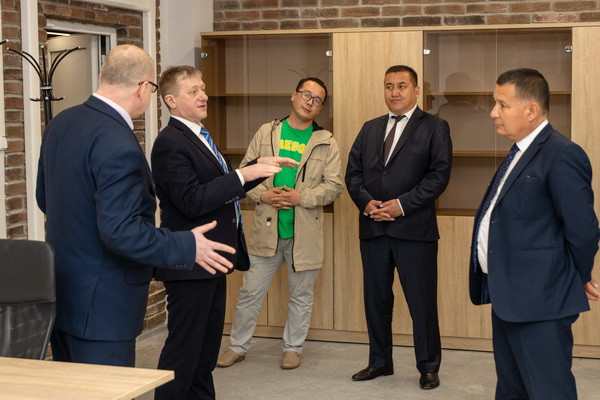
Delegations from the Karakalpak State University named after Berdakh and the Urgench State University of Uzbekistan, headed by the rectors, visited the Science and Technology Park of the Yanka Kupala State University of Grodno.
This event took place as part of the business visit of the Uzbek partners to the Yanka Kupala State University of Grodno and became one of the leading in the cycle of working meetings.
The acquaintance with the Science and Technology Park of Kupala University was opened by a tour of the second stage of the Technopark building under construction, which will be put into operation soon. Vice-rector for research at Yanka Kupala State University Yuri Romanovsky introduced the guests to the infrastructure of the facility, its production and innovative capabilities. The delegations visited open-space and co-working zones, a conference hall, production and office premises.
Then the guests were given the opportunity to get acquainted with the existing production facilities and laboratories that operate on the basis of the Science and Technology Park, as well as communicate with residents and participants of the Yanka Kupala State University of Projects and Startups Studio. As the rector of the Karakalpak University Akhmed Reimov noted during the conversation, the Yanka Kupala State University of Grodno has achieved very good results in organizing promising methods of work, and a striking example of this is the consolidation of educational, scientific and innovative activities on the basis of the Science and Technology Park. In addition, Akhmed Reimov stressed that acquaintance with the progressive experience of Kupala University will be very useful for the development of further activities of universities in Uzbekistan.
The study of promising developments at Yanka Kupala State University of Grodno by partners from Uzbekistan continued the seminar "On the scientific and educational activities of departments", where deans of faculties and heads of departments of Yanka Kupala State University of Grodno shared the best developments in the educational and scientific sphere, talked about the specifics of the educational process in various directions , practice-oriented methods of training specialists, a system of interaction with customers of personnel and innovative research projects on which the university scientists are working.
At the end of the meeting, representatives of the Uzbek delegation thanked the management and staff of Kupala University for the warm welcome, and also expressed hope for the soonest implementation of joint agreements within the framework of the signed cooperation agreements.
The visit of the Uzbek partners to the Yanka Kupala State University was completed by a tour of the historical center of Grodno.
The II International Scientific and Practical Internet Conference "Social, Cultural and Communicative Practices in the Dynamics of Social Development" was held at Kupala University
Scientists from Belarus, Russia and China took part in the conference.
The scientific forum was held at the Faculty of History, Communication and Tourism at Yanka Kupala State University of Grodno on May 20 and 21 in an online format. As part of the conference, researchers from the three countries discussed historical processes through the prism of the development of socio-cultural practices, trends in the development of historical science, the culture of communications in the context of digital and socio-cultural globalization. Also, the problem field of the scientific forum covers sociology and social practices, intercultural communication in institutional and everyday practices.


